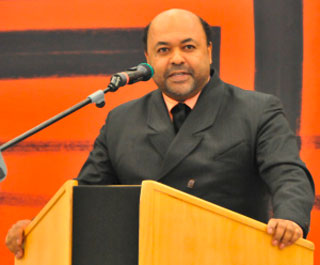|
The growing interest in the humanitarian impact of nuclear weapons was the focus of major international conferences in Oslo, Norway and Nayarit, Mexico in March 2013 and February 2014, respectively. Another such conference will convene in December 2014 in Vienna. What we are seeing is the emergence of a new way of looking at nuclear weapons- a new paradigm that questions the compatibility of nuclear weapons with international humanitarian and human rights laws. New thinking is confronting old weapons and this is something upon which to build future disarmament initiatives.
The second initiative should involve expanded efforts to end the stalemate in the UN disarmament machinery – in particular the Disarmament Commission, the General Assembly's First Committee and the Conference on Disarmament. The meetings last year of the General Assembly's open-ended working group on taking forward multilateral disarmament negotiations was an important step in this direction and I am sure we will witness many other such initiatives in the future.
Thirdly, we need to do more to promote education on disarmament and non-proliferation issues. The world community has a long history of efforts to deepen the public's understanding of the dangers posed by nuclear weapons and the benefits of eliminating them. Much of this work was reinforced by the 2006 UN Study on Disarmament and Non-proliferation Education. Universities, specialized institutions and NGOs have contributed to this awareness by offering courses dealing with many of the practical challenges of achieving disarmament and non-proliferation goals.
f we truly wish the next generation (represented by the youth, as we see here and around the world) to be the last to live under the shadow of nuclear war, we must do more to ensure that they have the information and understanding necessary to change nuclear disarmament from a desirable goal to an accomplished fact – and education will be indispensable in meeting this need.
Here in Vienna, various educational programmes and publications of the Preparatory Commission for the Comprehensive Nuclear-Test-Ban Treaty Organization (CTBTO) have helped to bring this treaty close to universal membership. They have promoted the treaty by stimulating a growing number of stakeholders, particularly from civil society, scientists and many others to embark on initiatives to ban nuclear testing.
Meanwhile, the UN Office for Disarmament Affairs, CTBTO and other entities such as the Vienna Centre for Disarmament and Non-Proliferation (VCDNP) are jointly developing an online course platform that will address a wider range of disarmament and non-proliferation issues.
These three initiatives have the potential to inject new political momentum to our collective aspirations. In recognising both the ordeals of the survivors of two nuclear attacks and the interests of future generations, we must all redouble our efforts to achieve the goal of a world free of nuclear weapons.
We all know this work will not be easy. The road we have travelled has been difficult, often with unexpected sharp turns and obstacles along the way, but the journey ahead is surely one we must complete.
UNODA's support to today's event is another way that the UN highlights the importance of striving for a world free of nuclear weapons. I would personally like to thank each and every one of you for coming to this event, particularly the young generation – for it provides further evidence that our journey is continuing.
|

